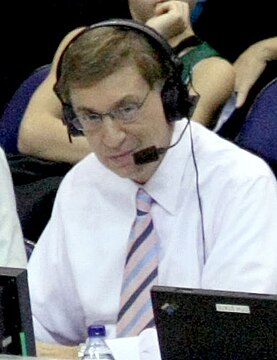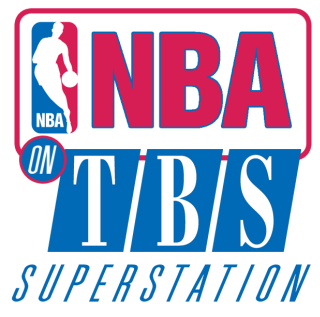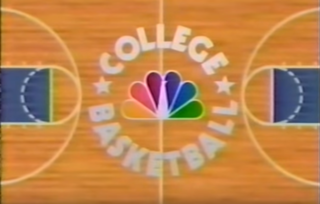
Marv Albert is an American retired sportscaster. Honored for his work as a member of the Basketball Hall of Fame, he was commonly referred to as "the voice of basketball". From 1967 to 2004, he was also known as "the voice of the New York Knicks". Albert worked for Turner Sports as the lead announcer for NBA games on TNT until his retirement at the end of the 2020–21 season.
Richard Edward Stokvis, known professionally as Dick Stockton, is an American retired sportscaster. Stockton began his career in Philadelphia, then moved to Pittsburgh, where he worked as the sports director for KDKA-TV. In Boston, he called Celtics games for WBZ-TV and Red Sox games for WSBK-TV before transitioning to national broadcasting, which included calling the 1975 World Series for NBC and later, the NBA Finals for CBS. In a career that spanned over five decades, Stockton worked for several different networks, most prominently CBS Sports, Fox Sports, and Turner Sports.

Ernest Thorwald Johnson Jr. is an American sportscaster for Turner Sports. Johnson is currently the television voice and a studio host for Major League Baseball on TBS, hosts Inside the NBA for TNT, and NBA TV and contributes to the joint coverage of the NCAA Division I men's basketball tournament for Turner and CBS Sports. His father was Ernie Johnson Sr., a Major League Baseball pitcher and Atlanta Braves play-by-play announcer.

Ian Eagle is an American sports announcer. He calls NBA, NFL, and college basketball games on CBS, TNT, and TBS, as well as Brooklyn Nets games on the YES Network and French Open tennis for Tennis Channel. Other announcing experiences include Army–Navy football games, boxing, and NCAA track and field for CBS.

NBA on TNT is a branding used for broadcasts of the National Basketball Association (NBA) games, produced by Turner Sports, the sports division of the Warner Bros. Discovery Sports subsidiary of Warner Bros. Discovery and televised on TNT since 1989. TNT's NBA coverage includes the Inside the NBA studio show, weekly doubleheaders throughout the regular season on Tuesdays and Thursdays, a majority of games during the first two rounds of the playoffs, and one conference finals series.
The National Basketball Association is shown on national television on broadcast channel ABC, cable networks ESPN and TNT. The NBA is also shown on multiple regional sports networks. Currently, ESPN shows doubleheaders on Wednesday and Friday nights, while TNT shows doubleheaders on Thursday and Tuesday nights. In the second half of the season, ABC shows a single game on Saturday nights and Sunday afternoons. Games are shown almost every night on NBA TV. There are some exceptions to this schedule, including Tip-off Week, Christmas Day, and Martin Luther King Jr. Day. More games may be shown as the end of the regular season approaches, particularly games with playoff significance. During the playoffs, the first round are split between TNT, ESPN, NBA TV, and ABC on mostly weekends the second round are split between ESPN, TNT and ABC on weekends. The conference finals are split between ESPN/ABC and TNT; the two networks alternate which complete series they will carry from year to year. The entire NBA Finals is shown nationally on ABC. The NBA Finals is one of the few sporting events to be shown on a national broadcast network on a weeknight.

The 2011 NCAA Division I men's basketball tournament was a single-elimination tournament involving 68 teams to determine the national champion of the 2010–11 NCAA Division I men's basketball season. The 73rd edition of the NCAA Tournament began on March 15, 2011, and concluded with the championship game on April 4 at Reliant Stadium in Houston, Texas. This tournament marked the introduction of the "First Four" round and an expansion of the field of participants from 65 teams to 68. The "South" and "Midwest" regional games were replaced by the monikers "Southeast" and "Southwest" for this tournament, due to the geographical location of New Orleans and San Antonio, respectively.
Brian Anderson is an American sportscaster. Since 2007, he has called play-by-play for the Milwaukee Brewers' telecasts on Bally Sports Wisconsin. As a part of his work on the 2007 Brewers Preview Show, Anderson and the Bally's team were awarded a regional Emmy Award.

The NBA on TBS is an American presentation of National Basketball Association (NBA) regular season and playoff game telecasts that aired on the American cable and satellite network TBS. The games were produced by Turner Sports, the sports division of the Turner Broadcasting System subsidiary of Time Warner, TBS's corporate parent.

Turner Sports is a sports division of Warner Bros. Discovery that is responsible for sports broadcasts on various channels. Formerly the sports division of Turner Broadcasting System, its sports operations include the TBS, TNT, AT&T SportsNet, TruTV and Motor Trend channels, as well as the online digital media outlets for the NCAA, NBA, PGATour, and PGA. It also operates Bleacher Report, and its streaming service, B/R Live, as well as NBA TV on behalf of the NBA. It also owns Motor Trend Group and a minority share in the MLB Network.

College Basketball on NBC Sports is the de facto branding used for broadcasts of NCAA Division I men's college basketball games produced by NBC Sports, the sports division of the NBC television network in the United States. The NBC network broadcast college basketball games in some shape or form between 1969 and 1998. From 1969 to 1981, NBC covered the NCAA Division I men's basketball tournament. It became the first major network to broadcast the championship game, at a cost of more than US$500,000 in 1969.

College Basketball on CBS Sports is the branding used for broadcasts of men's NCAA Division I basketball games that are produced by CBS Sports, for CBS, CBSSN, and Facebook.

NCAA March Madness is the branding used for coverage of the NCAA Division I men's basketball tournament that is jointly produced by CBS Sports, the sports division of the CBS television network, and Turner Sports, the national sports division of Warner Bros. Discovery in the United States. Through the agreement between CBS and Warner Bros. Discovery, which began with the 2011 tournament, games are televised on CBS, TNT, TBS and truTV. CBS Sports Network has re-aired games from all networks.

The 2014 NCAA Division I men's basketball tournament involved 68 teams playing in a single-elimination tournament to determine the national champion of men's NCAA Division I college basketball. It began on March 18, 2014, and concluded with the UConn Huskies winning the championship game on April 7 at AT&T Stadium in Arlington, Texas.

The 2015 NCAA Division I men's basketball tournament involved 68 teams playing in a single-elimination tournament to determine the national champion of men's NCAA Division I college basketball. The 77th edition of the tournament began on March 17, 2015, and concluded with the championship game on April 6 at Lucas Oil Stadium in Indianapolis. Duke defeated Wisconsin in the championship game, 68–63. Tyus Jones of Duke was the tournament's Most Outstanding Player.

The 2016 NCAA Division I men's basketball tournament involved 68 teams playing in a single-elimination tournament to determine the men's National Collegiate Athletic Association (NCAA) Division I college basketball national champion for the 2015–16 season. The 78th edition of the Tournament began on March 15, 2016, and concluded with the championship game on April 4 at NRG Stadium in Houston, Texas.

The 2017 NCAA Division I men's basketball tournament involved 68 teams playing in a single-elimination tournament to determine the men's National Collegiate Athletic Association (NCAA) Division I college basketball national champion for the 2016–17 season. The 79th edition of the tournament began on March 14, 2017, and concluded with the championship game on April 3 at University of Phoenix Stadium in Glendale, Arizona. The championship game was the first to be contested in a Western state since 1995 when Seattle was the host of the Final Four.

The 2019 NCAA Division I men's basketball tournament was a single-elimination tournament of 68 teams to determine the National Collegiate Athletic Association (NCAA) Division I men's college basketball national champion for the 2018–19 season. The 81st annual edition of the tournament began on March 19, 2019, and concluded with the championship game on April 8 at U.S. Bank Stadium in Minneapolis, Minnesota, between the Texas Tech Red Raiders and the Virginia Cavaliers, with Virginia winning 85–77 in overtime.

The 2022 NCAA Division I men's basketball tournament involved 68 teams playing in a single-elimination tournament that determined the National Collegiate Athletic Association (NCAA) Division I men's college basketball national champion for the 2021–22 season. The 83rd annual edition of the tournament began on March 15, 2022, and concluded with the championship game on April 4 at the Caesars Superdome in New Orleans, Louisiana, with the Kansas Jayhawks defeating the North Carolina Tar Heels, 72–69, to claim the school’s fourth national title.
As the national broadcaster of the NBA, CBS aired NBA games from the 1973–74 until the 1989–90 season, during which the early 1980s is notoriously known as the tape delay playoff era.















